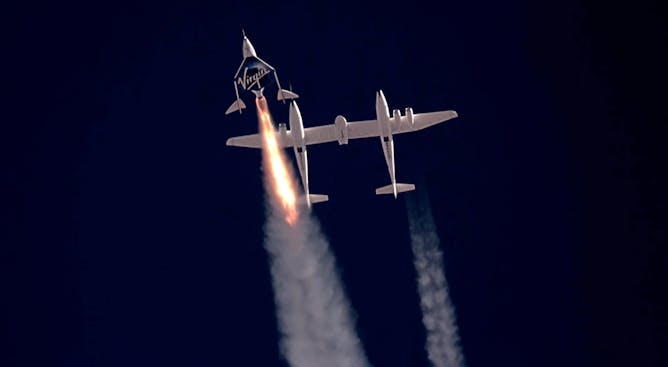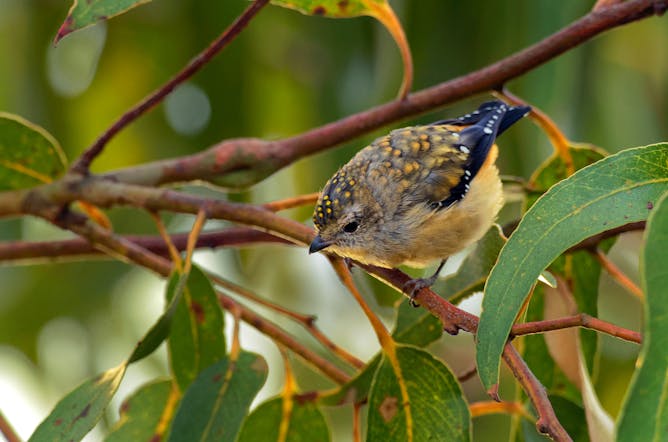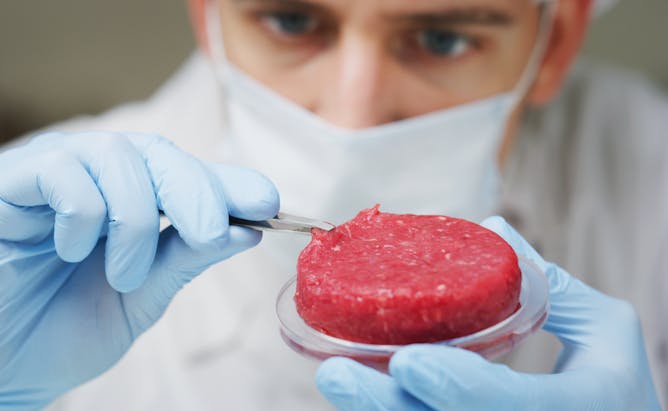|
|
|
|
Sir Richard Branson went where no billionaire businessman had gone before last weekend, when he and his five-person crew ascended 53 miles to what his publicity team rather breathlessly described as the “edge of space”. Beating his fellow billionaire Jeff Bezos by nine days, Branson hailed the flight as the start of space tourism: “Nothing can prepare you for the view of Earth from space,” he said, although strictly speaking this has been a fairly common view since 1946, when American scientists put a camera on a V2 rocket.
But, all hairsplitting aside, Branson’s is quite an achievement. It is just left to us earthbound mortals to debate whether Branson and his crew actually got as far as space, and whether we’ll all be packing spacesuits in the foreseeable future or whether this will be a trip reserved for the super-rich. Read all about it here.
I’m glad to report that in our neck of the woods it was dry and, late in the day at least, sunny on Thursday, which was St Swithin’s Day. The reason for this weather report is that – according to legend – “Swithin’s Day if thou dost rain’/For forty days it will remain.” So we’re set fair until the end of August, apparently, as it appears there’s a certain amount of method in that myth.
A row is brewing between French champagne makers and the Kremlin after the Russian government passed a law requiring that only bubbly produced in Russia can bear the denomination “shampanskoye” and all others must be labelled as “sparkling wine”. As you’d expect, France is unlikely to take this lying down.
This week we also reported on some good news for ethical chocoholics, looked at why some people switch allegiances between political parties and looked at five ways emojis are reflecting COVID culture.
From our colleagues around the world, meanwhile, how the history of Zimbabwe played itself out on the country’s cricket fields, how the intensely hot weather is affecting Canada’s rivers and lakes, and, from Australia, why the UN’s ten-year plan to protest the world’s wildlife falls short.
Do try to make time to listen to The Conversation Weekly podcast, which looks the whys and wherefores of lab-grown and plant-based meat. And, if you like what you hear, tune in to our collaboration with News Over Audio for some of our best narrated content. Plus to keep up with all the latest from the world of vaccines, make sure you read our weekly vaccine round-up.
|
Jonathan Este
Associate Editor, International Affairs Editor
|

|
|

Did Virgin Galactic really go to the edge of space?
VIRGIN GALACTIC/EPA
Ian Whittaker, Nottingham Trent University; Gareth Dorrian, University of Birmingham
No new records have been broken and no new technology has been tested.
|
|
|
-
Helen Parish, University of Reading
If it rains on St Swithin's day it is believed that it will rain for the rest of summer.
|
|
|
|

Shebeko/Shutterstock
Enrico Bonadio, City, University of London; Magali Contardi, Universidad de Alicante
A new Russian law forces French champagne producers to label their products as 'sparkling wine'.
|
|
|
-
Michael Rogerson, University of Bath; Glenn Parry, University of Surrey; Pedro Lafargue, University of the West of England
DNA testing for cocoa beans could fight slavery and child labour.
-
Paul Webb, University of Sussex; Tim Bale, Queen Mary University of London
Switching political parties is fairly common in Britain. But does that mean parties are being shaped by entryism?
|
|
|
|

Rawpixel.com/Shutterstock
Philip Seargeant, The Open University
The story of the pandemic, in emojis.
|

Zimbabwe’s Sikandar Raza (R) celebrates with teammate Brian Mudzinganyama at the Harare Sports Club in 2020.
Simon Maina/AFP via Getty Images
Trishula Patel, Georgetown University
Nine immigrants founded a cricket club in 1934 in Rhodesia. The Sunrise club survives to this day, part of Zimbabwe's national culture.
|
|
|
-
Sapna Sharma, York University, Canada; Iestyn Woolway, European Space Agency; John P. Smol, Queen's University, Ontario
The growing frequency of climate extremes affected human health and caused wide-scale damages to the ecosystems that people depend upon, including agriculture, fisheries and freshwater.
|
|
|
|

The forty-spotted pardalote is one of Australia’s rarest birds.
Shutterstock
Michelle Lim, Macquarie University
The Convention on Biological Diversity aims to achieve a world "living in harmony with nature". This won't happen if the plan goes ahead in its current form.
|

Would you eat cultured meat?
HQuality via Shutterstock
Gemma Ware, The Conversation; Daniel Merino, The Conversation
Plus, new research from Indonesia on the relationship between cigarette advertising near schools and children smoking.
|
|
|
-
Rob Reddick, The Conversation
Some deaths among the vaccinated are to be expected given how high the threat of COVID-19 is to older people.
|
|
| |
Featured events
|

|
Whiteknights House, PO Box 217, Reading, Reading, RG6 6AH, United Kingdom of Great Britain and Northern Ireland — University of Reading
|

|
Sustainable Places Research Institute, Cardiff University, Cardiff, Cardiff [Caerdydd GB-CRD], CF10 3BA, United Kingdom of Great Britain and Northern Ireland — Cardiff University
|

|
University of Essex, Wivenhoe Park, Colchester, Essex, CO4 3SQ, United Kingdom of Great Britain and Northern Ireland — University of Essex
|
|
|
|
| |
| |
| |
| |
| |
|
|
|
|
|
|
|